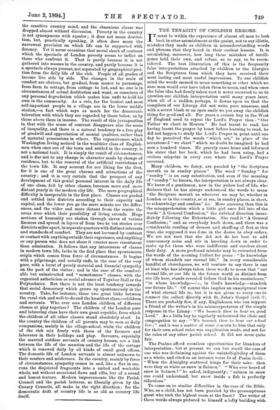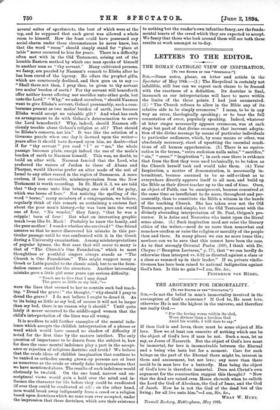THE TENACITY OF CHILDISH ERRORS.
IT must be within the experience of almost all men to look back in utter astonishment at the quaint, not to say idiotic, mistakes they made as children in misunderstanding words and phrases that they heard in their earliest lessons. It is astonishing, moreover, how long these mistakes of intelli- gence hold their own, and refuse, so to say, to be recon- sidered. The best illustration of this is the frequently false interpretations attached by children to the liturgies and the Scriptures from which they have received their most lasting and most useful impressions. To our childish mind the words seemed to mean something or other which no sane man would ever have taken them to mean, and when once the false idea had firmly taken root it never occurred to us to question our childish interpretation until many years later, when all of a sudden, perhaps, it dawns upon us that the compilers of our Liturgy did not write pure nonsense, and with a secret blush or an open smile we put away the childish thing for good and all. For years a certain boy in the West of England used to repeat the Lord's Prayer thus : "Our Father we chart in Heaven." He had learnt to read, but having learnt the prayer by heart before learning to read, he did not happen to study the Lord's Prayer in print until one day he perceived the words "which art," in place of the accustomed "we chart" which no doubt he imagined he had seen a hundred times. He gravely came home and informed his sister that her book, which he had been using, had a curious misprint in every case where the Lord's Prayer occurred.
Many children, we fancy, are puzzled by "the Scripture moveth us in sundry places." The word " Sunday " for " sundry " is an easy substitution, and even if the meaning of " sundry " be known, the interpretation is not always clear. We know of a gentleman, now in the yellow leaf of life, who declares that he has always understood the words to mean "the Scripture moveth us wherever we may be, whether in London or in the country, or at sea, in sundry places, in short, to acknowledge and confess," &c. More amusing than this is the misapprehension which a little girl once fell into of the words "A General Confession," the rubrical direction imme- diately following the Exhortation. She read it " I General Confusion;" and as everybody knelt down, and there was a considerable rustling of dresses and shuffling of feet at this time, she supposed it was done in the desire to obey orders. We are not sure that she did not do her beat to add unnecessary noise and stir in kneeling down in order to make up for those who were indifferent and careless about their duty. A more profound mistake may be extracted from the words of the morning Collect for peace : "In knowledge of whom standeth our eternal life." In every considerable handful of churchgoers, we will venture to say there is one at least who has always taken these wot d3 to mean that "our eternal life, or our life in the future world as distinct from our life here, stands revealed before God in his omniscience," "in whose knowledge--i.e., in God's knowledge —standeth our future life." Of course this implies an unscriptural view of what eternal life is; but it is not given to every one to connect the collect directly with St. John's Gospel (xvii. 3. There are probably few, if any, Englishmen who can support a friend of the writer's in his misinterpretation of the simple response in the Litany: "We beseech thee to hear us, good Lord." As a little boy he regularly understood the choir and congregation to say : "We beseech thee to hear our school law ; " and it was a matter of some concern to him that only for their own school rules was supplication made, and not for the rules of any other parish school. It did not seem quite fair.
The Psalms afford countless opportunities for blunders of interpretation; but at present we can but recall the case of one who was declaiming against the unintelligibility of them as a whole, and cited as an instance verse 14 of Psalm lxviii. : "When the Almighty scattered kings for their sake : then were they as white as snow in Salmon." "Who ever heard of snow in Salmon ? " he asked, indignantly ; "salmon in snow one could understand, but snow inside a fish is perfectly ridiculous."
To come on to similar difficulties in the case of the Bible. Who, as a child, has not been puzzled by the presumptuous guest who took the highest room at the feast P The writer of these words always pictured to himself a lofty building with several suites of apartments, the best of which were at the top, and he supposed that each guest was allowed a whole room to himself. How the feast could have possessed any social charm under these circumstances he never knew, but that the word "room" should simply stand for "place at table" never occurred to him for years. There is a difficulty often met with in the Old Testament, arising out of the humble Eastern method by which one man speaks of himself to another man as "thy servant." Many cultivated persons, we fancy, are puzzled by Naaman's remark to Elisha after he has been cured of the leprosy. He offers the prophet gifts, which are courteously declined, and then goes on to say :— " Shall there not then, I pray thee, be given to thy servant two mules' burden of earth ? For thy servant will henceforth offer neither burnt offering nor sacrifice unto other gods, but unto the Lord." "Why," we asked ourselves, "should Naaman want to give Elisha's servant, Gehazi presumably, such a cum- bersome present as two mules' burden of earth, just because Elisha would accept no valuable gift? And what has such an arrangement to do with Gehazi's determination to serve the Lord henceforth? Why, indeed, should Naaman offi- ciously trouble about Gehazi's religion at all ? That should be Elisha's concern, not his." It was like the solution of a tiresome puzzle when one day it dawned upon the writer— years after it should have dawned upon him, no doubt—that if for "thy servant" you read " I " or "me," the whole passage becomes plain, except indeed the use of the mule's burden of earth to Naaman himself. This was, no doubt, to build an altar with. Naaman fancied that the Lord, who preferred the waters of Jordan to those of Abana and Pharpar, would likewise prefer an altar made of the soil of Israel to any other reared in the region of Damascus. A more curious, if less excusable, misinterpretation from the New Testament is worth recording. In St. Mark ii. 3, we are told that "they come unto him bringing one sick of the palsy, which was borne of four." Not noticing the spelling of the word "borne," many members of a congregation, we believe, regularly think of this remark as containing a curious fact about the poor man's history,—he was born into the world one of four. "No wonder," they fancy, "that he was a cripple ! born of four ! But what an interesting graphic touch l—so like St. Mark ! Probably he knew the family, and the poor mother ! I wonder whether she survived?" One friend assures us that he never discovered his mistake in this par- ticular passage until he was confronted with it in the Greek during a University examination. Among misinterpretations of popular hymns, the first case that will occur to many is that of "The Church's One Foundation," which to most thoughtless or youthful singers always stands as "The Church is One Foundation." This might suggest many a Greek or Latin parallel to the classic mind, but to us the foun- dation cannot stand for the structure. Another interesting mistake gave a little girl some years ago serious difficulty.
"Teach me to live that I may dread The grave as little as my bed; "- were the lines that seemed to her to contain such bad teach- ing. "Dread the grave !" she thought, "why should I pray to dread the grave ? I do not believe I ought to dread it. As to its being as little as my bed, of course it will not be larger than my bed, there is no reason why it should." Until quite lately it never occurred to the middle-aged woman that the child's interpretation of the lines was all wrong.
It is needless to add further examples of the mental indo- lence which accepts the childish interpretation of a phrase or word which would have caused no shadow of difficulty if noted for the first time by the mature intellect. The only question of importance to be drawn from the subject is, how far does the same mental indolence play a part in the accept- ance or rejection of religious doctrine and truth? We believe that the crude ideas of childish imagination that continue to be ranked as orthodox among grown-up persons are at least as numerous as the crude or utterly false interpretations that we have mentioned above. The results of such indolence would obviously be twofold. On the one hand, narrow and un- scriptural views would gain a hold over the mind and in- fluence the character for life before they could be eradicated (if ever they could be eradicated at all) ; on the other hand, men would break away indignantly from a creed or a religion based upon doctrines which no sane man ever accepted, under the impression that these doctrines, which owe their existence.
to nothing but the reader's own infantine fancy, are the funda- mental tenets of the creed which they are expected to accept. We fancy that those who look around them will see both these results at work amongst 1113 to-day.







































 Previous page
Previous page